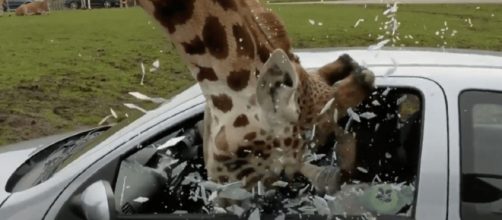As the Easter holidays wind to a close many of us will be thankful to send the kids back to school. As lovely as it is to have your children at home for a few weeks, it can be a nightmare planning activities to keep them entertained. one popular attraction, West Midland Safari Park, is always a hit with the kids young and old alike. Earlier today (09/04/2018) howeve,r an incident at the park has left many shocked. Surprisingly it is not the safety of the visitors concerned but the safety of the animals living there that has been thrown into question.
The incident
Earlier today a giraffe by the name of Strider had a glass window smashed on his head. The video below appears to show the Strider poking his head into a visitor's car most likely to get some food. To many visitors, this very passive action would be a sweet photo opportunity with the kids or would make an amazing selfie for Instagram.
The visitor involved in the incident, however, did not see it as such and instead decided to roll up the window, with the giraffe's head still inside. The window shattered around the giraffe, causing the animal to become distressed but thankfully not injured.
West Midlands safari park has released a statement:
"As this incident is under investigation, we cannot currently comment.
However, the giraffe was checked over immediately by staff and sustained no injuries from the glass."
Understandably there has been some public outrage, with many asking why would you leave your window down if you had no intention of feeding the giraffe? Why close the window on its head? and many people claim this is animal cruelty.
Why would you try and close the window on a Giraffes neck!? 😡 this is what they do at the Safari Park, they get fed through the window also, if the animal had panicked it could have caused aloy of damage to itself and the car/people..
— Sarah Phillips (@SPhillips9210) 9 April 2018
Poor giraffe, apparently it's ok according to Safari FB page, but those people should be charged with animal cruelty and endangerment !!!!! Absolute idiots.
— lotty (@lottpott75) 9 April 2018
This story has highlighted much more than the stupidly of closing a window on a giraffes head, it has thrown into question how safe animals are in captivity which is centred around entertaining the general public.
How safe are the animals?
Unfortunately, the safety of Animals In Captivity being thrown into jeopardy by the actions of humans is not an isolated incident. Back in 2016 Harrabie, a Western lowland gorilla was killed after a boy climbed into the enclosures. There was a general feeling amongst the public that his death was unnecessary, which it was. Regardless of who you think is a fault, the zoo's fences and staff should have ensured there was no way that small boy could have climbed into the enclosure.
in December last year, London zoo suffered an unexplained fire which cost the lives of four meerkats and an aardvark. Many more of the animals who live there were put in danger by this fire, and the casualties could have potentially been much higher.
This leads me to question, how effective and safe are zoos for the animals?
Originally, zoos and wildlife parks were developed as a way for us to study nature, protect endangered species from poachers or deforestation and to implement breeding programmes for species. The feeling was that they should never be a permanent solution but rather an attempt to allow nature to recover from human destruction. This is something backed by the Aspinall Foundation, an organisation (who despite owning many zoos and wildlife parks themselves) would like to make such institutions obsolete.
From my perspective, the real threat to the wildlife in these parks are we, the visitors, as we create so many of the problems.
Take the incident that I mentioned earlier with Strider the giraffe. We see guests who were selfish enough to risk the safety of an aminal because they didn't want to interact with it.
This is not the only way we affect these animals' quality of life. Think of all the times you have seen a sign saying don't touch the glass, yet we find kids and some adults banging on the glass for fun. Think about how loud zoos are and this is the home for these animals. As consumers we don't follow the rules, we litter, make noise and disregard the instructions for our own safety and when a tragedy happens we don't adapt our behaviour.
In the future, I hope zoos at least become less commercialised and we learn to respect the nature that's there.
I hope we are more conscious about the effect we have on the planet so we no longer need to keep animals in captivity for the safety of their species and instead, they can live in the wild where they belong.


